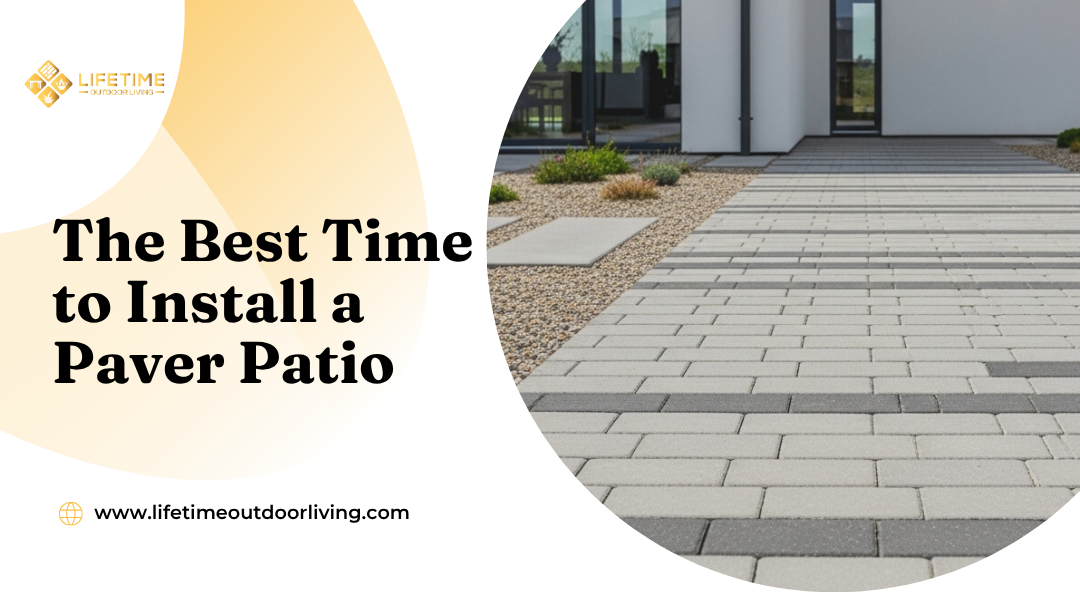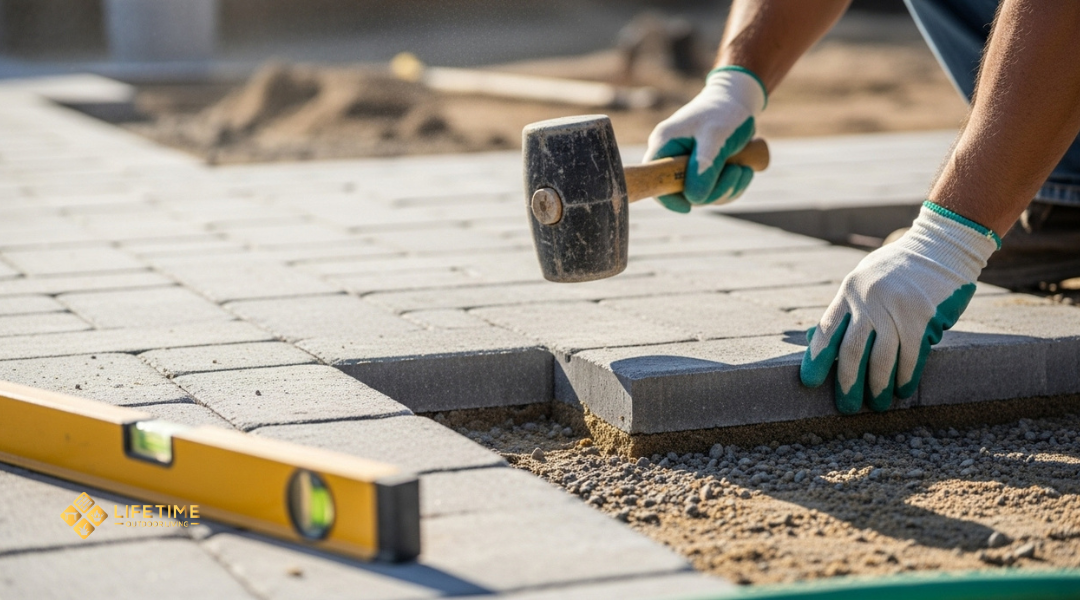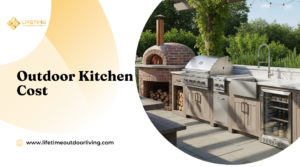In Southern California, timing plays a key role in the successful installation of paver patios and driveways. The best time to install pavers in SoCal is during the cooler months, typically between late fall and early spring, when temperatures are moderate and rainfall is minimal. This period ensures optimal curing of materials and reduces potential issues caused by extreme heat or wet conditions.
Lifetime Outdoor Living, a trusted paving contractor based in Laguna Beach, understands the local climate’s impact on outdoor construction. By choosing the right season, homeowners can avoid delays, secure better pricing, and achieve a longer-lasting installation. Knowing when to schedule your project helps create a smooth experience and a durable, attractive result.
The Impact of Seasons on Paver Installations
Seasonal conditions directly affect how pavers set and perform over time. Temperature, moisture, and local weather patterns influence the curing process and long-term durability.
Why Timing Matters: Temperature, Moisture & Curing
Paver mortar and base materials require specific temperature ranges to cure properly. In Southern California, ideal temperatures are generally between 50°F and 90°F.
Excessive heat can cause rapid drying, leading to cracks or weak bonding. Conversely, cold or damp conditions slow curing and may trap moisture, weakening the base.
Proper moisture management during installation ensures pavers settle evenly. Without it, shifting and uneven surfaces could develop, reducing lifespan.
The Role of Seasonal Weather Patterns in Southern California
Southern California’s Mediterranean climate offers dry summers and mild, wetter winters. Dry conditions in summer provide optimal installation conditions, minimizing delays caused by rain.
Winter rain increases the risk of water infiltration beneath pavers, which can disrupt the base. Contractors often schedule installations in spring and fall to avoid extreme heat and wet conditions.
Wind patterns can also impact dust and debris during installation, influencing surface cleanliness and adhesion.
Comparing SoCal to Other U.S. Regions: What Makes It Unique?
Unlike humid or cold climates seen in the Midwest or Northeast, Southern California experiences fewer freeze-thaw cycles. This reduces stress on paver materials over time.
High UV exposure requires selecting UV-resistant sealants to avoid color fading. The region’s stable temperatures mean faster curing compared to areas with wide seasonal swings.
Southern California’s lower rainfall levels reduce erosion issues common in wetter climates, allowing for more flexible installation timing.
Best Seasons to Install Paver Patios or Driveways in Southern California
Southern California’s climate influences the best installation times for paver patios and driveways. Factors like temperature, weather conditions, and contractor availability all play key roles.
Spring (March–May): Ideal Temperatures and Pre-Summer Rush
Spring offers moderate temperatures, typically between 60°F and 75°F, ideal for paver installations. The weather is generally dry, which helps the mortar and base materials cure properly without delay.
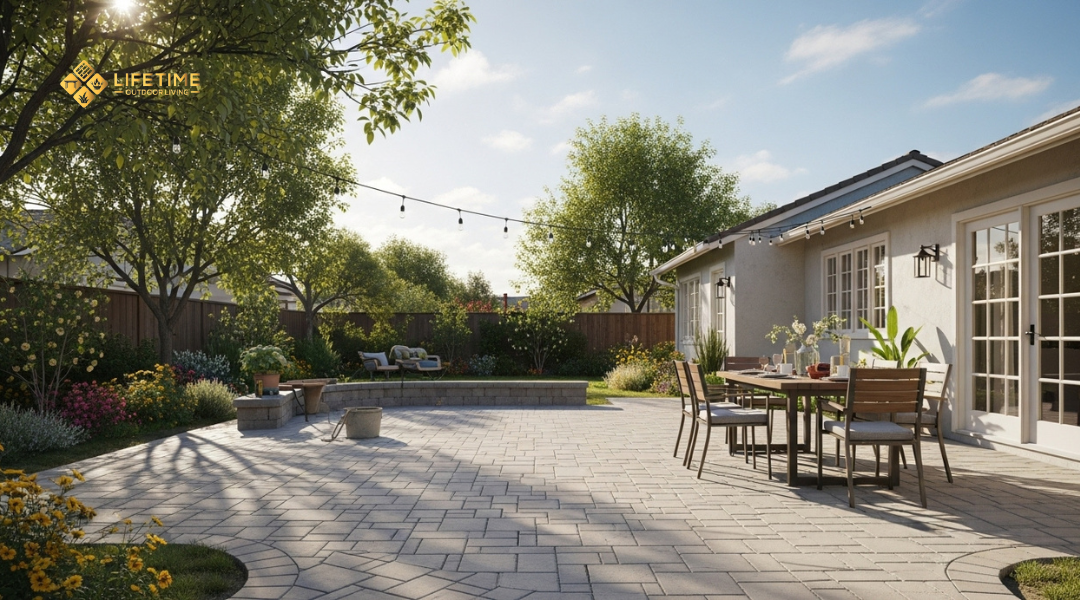
This season avoids the extreme heat of summer, reducing the chance of premature drying or cracking. However, as homeowners prepare for summer entertaining, demand for installations can increase, leading to tighter scheduling. Booking early in spring ensures access to preferred dates.
Fall (September–November): Dry Weather and Contractor Availability
Fall features consistently dry conditions with temperatures ranging from the mid-60s to low 80s. This stability supports strong curing and installation quality. Humidity levels are also low, improving the work environment for contractors.
Demand tends to decrease after summer’s peak, making contractors more available. This can result in better pricing or faster project start times. Fall is suitable for those seeking balance between good weather and scheduling flexibility.
Summer (June–August): Good Weather but High Demand
Summer offers long, dry days and temperatures frequently over 80°F. These conditions allow work to proceed without weather interruptions. However, high temperatures can cause faster mortar drying, which may affect installation integrity.
The season sees the highest demand because many homeowners want projects completed before fall. This can lead to increased costs and limited contractor options. Planning well ahead is essential for timely installations.
Winter (December–February): Pros and Cons of Off-Season Installs
Winter temperatures in Southern California usually remain mild, between 50°F and 65°F, suitable for paving work. The potential for rain increases but stays relatively low compared to other regions.
Contractor availability is typically highest in winter due to decreased demand. This offers more flexible scheduling and potentially lower rates. The main drawback is the risk of rain delays and cooler temperatures slowing curing times.
Weather Considerations That Affect Installation Quality
Weather impacts the durability and finish of paver patios and driveways. Moisture, temperature, and soil conditions directly influence material performance and the stability of the installation.
How Rain and Moisture Affect Base Compaction and Adhesion
Rain can saturate the sub-base, causing soil to become unstable and less compacted. This reduces the load-bearing capacity and leads to shifting or sinking of pavers over time.
Excess moisture also affects mortar or adhesive cure times. Wet conditions can prevent proper bonding, resulting in weaker joints that may crack or separate prematurely.
Installers must avoid working during or immediately after rain. Dry, stable ground ensures proper compaction and strong adhesion, crucial for a long-lasting surface.
Managing Heat: Avoiding Material Expansion and Worker Fatigue
High temperatures in Southern California cause pavers to expand, which can lead to uneven surfaces or cracking if installed during peak heat. It is best to schedule work in cooler morning or evening hours.
Heat also increases worker fatigue, potentially impacting installation quality and safety. Adequate hydration and breaks are essential to maintain focus and precision.
Proper planning around heat helps prevent thermal damage to materials and maintains the quality of workmanship throughout the project.
Ground Conditions: Soil Stability and Drainage Factors
Stable soil is necessary to support the weight of a paver patio or driveway without shifting. Expansive or clay soils in the region can swell with moisture, causing uneven settling.
Good drainage prevents water accumulation beneath the pavers, which can weaken the base and cause erosion. Installing drainage solutions, like French drains or slope grading, is often required.
Evaluating and preparing the soil and drainage beforehand reduces risk of future damage and ensures a stable, durable installation.
Project Planning Tips for Homeowners in Orange County
Successful patio or driveway installation depends on careful timing and preparation. Homeowners need to manage scheduling, approvals, material sourcing, and site readiness to avoid delays and added costs.
Lead Time: Why You Should Schedule Months Ahead
Scheduling a project several months in advance is crucial in Orange County. Most contractors, including Lifetime Outdoor Living, have busy calendars especially during peak seasons from spring to early fall.
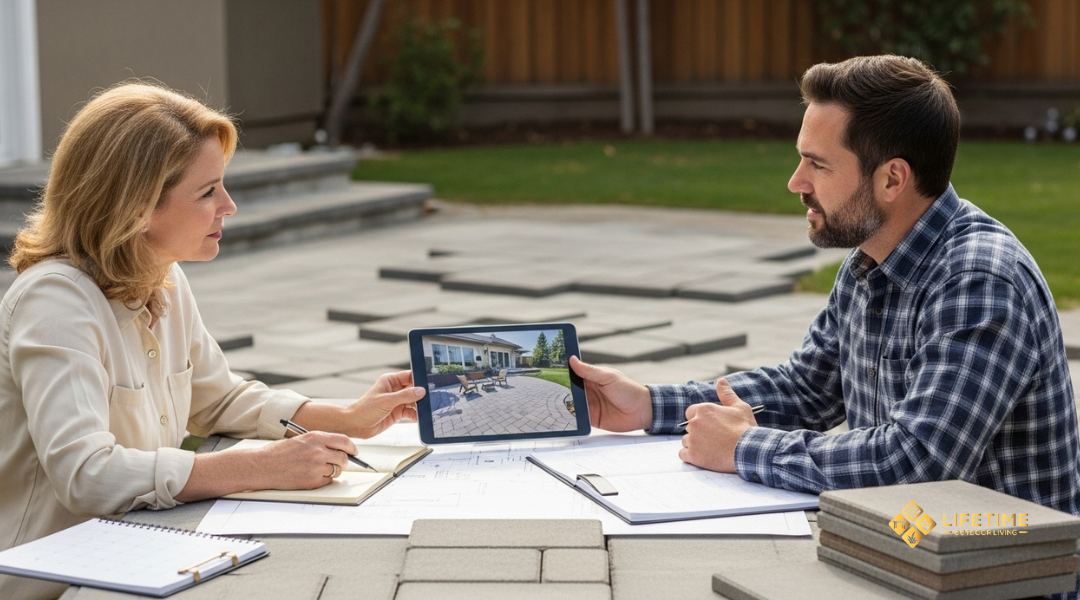
Booking early ensures availability of skilled crews and secures preferred project dates. It also allows enough time to plan and adjust for weather or supply delays.
Delays in scheduling can push projects into less optimal seasons, leading to potential issues with installation quality. Early planning reduces stress and helps align the timeline with homeowners’ needs.
HOA Approvals and Permits: Factor These Into Your Timeline
Many Orange County neighborhoods require homeowners to obtain HOA approvals before starting exterior projects. This review process can take from a few weeks to two months depending on the HOA’s meeting schedule and requirements.
Permits from the city or county are typically mandatory for driveways and structural patios. These permits ensure compliance with local building codes and regulations.
Homeowners should submit all required documents early. Missing paperwork or failing to follow procedures may cause significant project delays.
Material Availability and Supply Chain Considerations
Paver material availability can vary due to demand fluctuations and supply chain disruptions. Popular materials like natural stone or concrete pavers might experience delays of several weeks.
Ordering materials well ahead, especially custom or import items, ensures they arrive on time. Contractors like Lifetime Outdoor Living often advise clients to select materials early in the planning stage.
Being flexible with material choices can help avoid hold-ups. It also reduces the risk of price increases or substitutions during the project.
Preparing the Site: What Homeowners Can Do in Advance
Homeowners can speed up the installation by clearing the site before contractors arrive. This includes removing furniture, plants, or debris from the work area.
Marking utility lines and sharing any underground features with the contractor prevents damage and unexpected interruptions.
Ensuring proper drainage and addressing existing landscaping issues ahead of time reduces complications during installation. Communication with the contractor about site conditions is essential for a smooth process.
The Lifetime Outdoor Living Advantage
Lifetime Outdoor Living offers reliable solutions designed specifically for Southern California’s climate and landscape. Their services ensure proper timing, design customization, and lasting quality to fit each client’s unique needs.
Year-Round Installation Expertise Backed by Local Experience
Lifetime Outdoor Living understands the seasonal weather patterns in Laguna Beach. Their team schedules installations during optimal windows to avoid the rare heavy rains and extreme heat that can affect paver curing and durability.
They leverage local knowledge to prepare soil and drainage effectively, preventing common issues like settling or cracking. This ensures the paver patio or driveway maintains structural integrity regardless of installation time.
This expertise allows them to work confidently throughout the year, minimizing delays while maximizing long-term performance on every project.
Custom Design Consultations Tailored to Seasonality
Before installation, Lifetime Outdoor Living conducts in-depth consultations that consider seasonal light, temperature, and outdoor usage patterns. These factors influence material choice, color selection, and layout design.
They adjust designs to complement landscaping that varies with the seasons, ensuring patios and driveways enhance aesthetic appeal all year. Practical elements like shade from nearby trees or sun exposure are factored into the plan.
This tailored approach helps clients achieve functional outdoor living spaces that thrive through seasonal changes.
Lifetime Workmanship Warranty and Post-Project Support
Lifetime Outdoor Living provides a workmanship warranty that covers installation defects and material issues. This warranty reflects confidence in their technique and local expertise.
After project completion, they offer maintenance advice and ongoing support, helping clients address any concerns promptly. Their team remains accessible for inspections and repairs as needed.
This commitment minimizes potential problems, safeguarding the investment and ensuring satisfaction over time.

